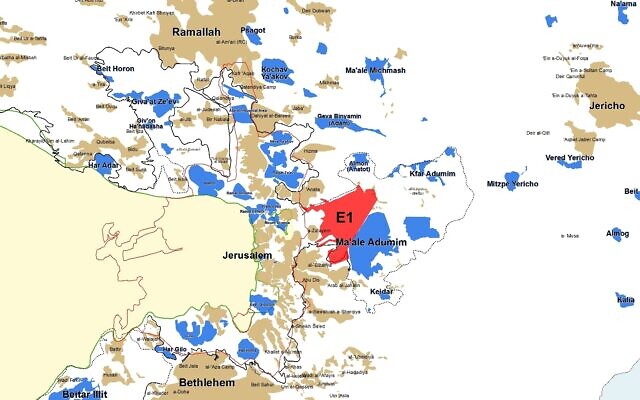After shelving plan bisecting West Bank in January amid international pressure and assuring US it wasn’t moving forward, Jerusalem places project back on docket for meeting in July
By JACOB MAGID, TOI 31 May 2022,

A Palestinian boy rides a donkey in the E-1 area near the West bank settlement of Ma’aleh Adumim, December 5, 2012. (Sebastian Scheiner/AP)
The Defense Ministry is planning to advance a controversial housing project in the E1 Area of the West Bank after the Israeli government withdrew the plan in January amid international pressure, and assured the Biden administration that it would not be moving forward with it.
The ministry’s Civil Administration body that authorizes West Bank construction published on Tuesday its agenda for a July 18 meeting to discuss objections to projects that have received initial approval. Two E1 plans totaling 3,412 housing units were the only ones on the docket.
The E1 project was first approved by former prime minister Benjamin Netanyahu’s government in 2012 and then put on hold for roughly eight years amid significant international pushback. The homes would be built between the Ma’ale Adumim settlement and Jerusalem in the middle of the West Bank, breaking up contiguity between Palestinian neighborhoods in East Jerusalem and the Palestinian cities of Ramallah and Bethlehem. The plan even received pushback during the Trump administration, which envisioned Israel annexing all West Bank settlements in the peace plan it presented in January 2020. Weeks later — and against the backdrop of a parliamentary election — Netanyahu took the plan off the back-burner, directing that it be advanced through the “deposit” stage.
The next stage in the planning process requires the Civil Administration’s High Planning Subcommittee to hear objections against the projects, which were filed by a large group of Palestinian attorneys along with several Israeli rights groups. Those hearings were delayed amid the repeated election cycles until August of last year. Two sessions were held but a final one scheduled for January was yanked from the agenda. US Ambassador to the US Tom Nides revealed in March that he had aggressively pushed the Israeli government to withdraw the plan.
“[You] can’t stop everything” and have to “pick [your] battles,” but “E1 was a disaster. I went full bore on E1,” he told the dovish group Peace Now in a webinar.
Jerusalem assured Washington that it would prevent the E1 construction from taking place, two Israeli and US officials told The Times of Israel in February.

A map of the housing projects Israel has planned in the E1 corridor. (Peace Now)
If the legal objections against the E1 plan are waived, as these often are, the project will still need several additional approvals before ground can be broken — a process that often takes months, if not years.
Nonetheless, Peace Now issued a statement blasting the latest development saying the unity government “is promoting Netanyahu’s dangerous policies.”
“The E1 plan poses a real threat for the chance for peace and thus has gained sharp opposition in Israel and internationally,” the left-wing group added.
The Defense Ministry did not respond to a request for comment.
However, the State Prosecutor’s Office confirmed the move later on Tuesday in its response to a petition from the Ma’ale Adumim settlement demanding that the Jerusalem District Court compel the state to finish the objection hearings on the E1 plan.
The Defense Ministry agenda was published just weeks before Joe Biden is expected to make his first visit to Israel as US president and weeks after Israel advanced plans for nearly 4,500 settlement homes throughout the West Bank, drawing Washington’s ire. However, a US official told The Times of Israel then that the announcement would not lead Biden to cancel his yet-to-be-finalized trip.
The last time Biden visited Israel was in 2010 when he was vice president. The trip was marred by an Israeli announcement of a project in the East Jerusalem neighborhood of Ramat Shlomo. Biden fumed at the time, saying in a statement that it “undermines the trust we need right now and runs counter to the constructive discussions that I’ve had here in Israel.”



Leave a Reply
You must be logged in to post a comment.